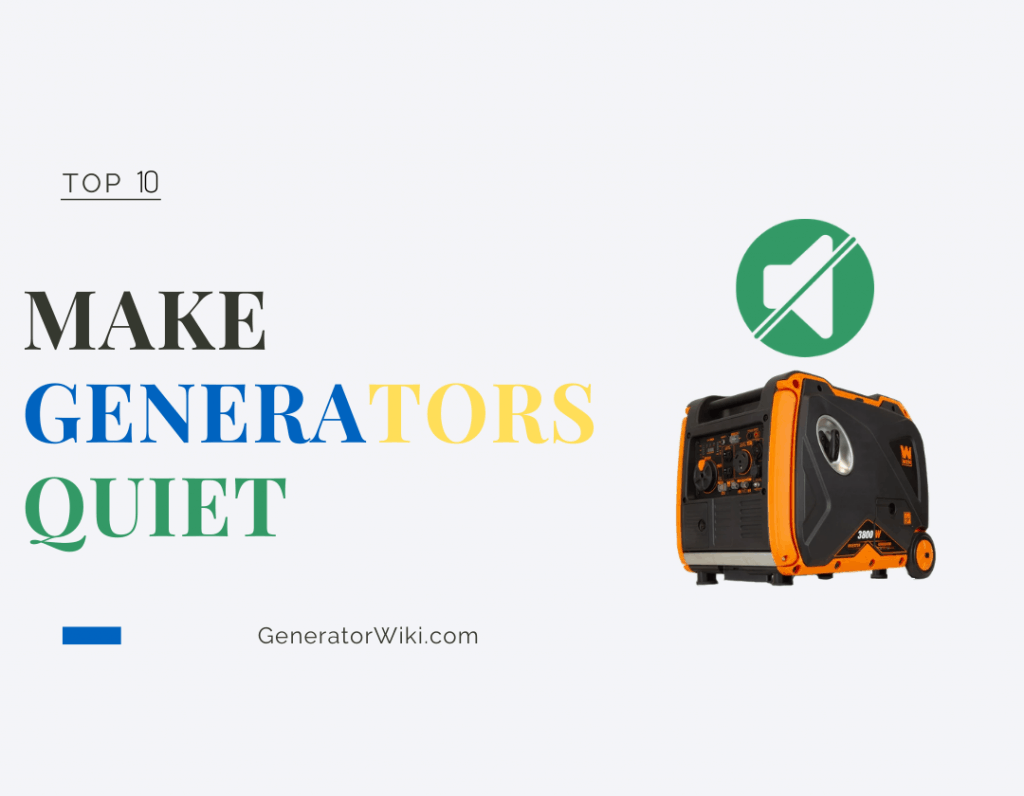My name is Zac, and I work as an electrical engineer in Florida. I work directly with generators every day. From power outages to RVs and everything in between, generators are essential in our lives and have many uses.
One of the questions I get asked the most is how to make generators operate more quietly. I have plenty of insight to share – from DIY option to RV suggestions and everything in between.
Stick with me to read all of my need to know tips on how to make a generator quiet.
How Generators Work
Generators are a power supply mechanism. They produce electricity to specific areas or items that are run on electricity. The generator operates through magnetism but then functions based on varying terms, such as hand cranking or even nuclear fission.
Who knew magnetism could truly be so useful?
Generators can be operated through various means – diesel, natural gas, propane or bi-fuel. But no matter what fuels the generator, it works essentially the same way across the board.
Generators can come in various sizes. Commercial businesses or even the Hoover Dam host exorbitantly large generators that can put out a significant amount of electricity. For the purposes of my illustrations and tips, we’re going to focus on residential-style generators for your home.
I would imagine these tips could be useful for the enormous generators as well, on a grand scheme.
Tips to Operate a Generator Safely
First things first, if you’re going to attempt to reduce the noise of your generator I want to be sure you are safely operating your generator. Here is a short list of tips for safe-handling when it comes to using a generator at your home.
- Operate generators a safe distance outside of the home. Don’t close your generator up in the garage during use, it would be much like running your car in the closed garage. Don’t even operate in the garage or directly under your eaves. Protect your home from carbon monoxide and operate it a safe distance from your home.
- Use a level surface area for operating your generator. There’s a reason the instructions tell you to use the generator on a level area – because that is how it operates best. If you try to run the generator on a slope, some engine parts may not get the oil they need to operate and eventually the generator will fail, and quite possibly be ruined.
- Keep supplies available. Generators require maintenance much like a vehicle would. Did you know that you should change the oil the first time after 25 hours of run-time? After that, it’s recommended an oil change every 60 hours.
I don’t know about you, but if you have a power outage or are out camping you could easily exceed that time frame. So just keep the items on hand and you should be good to go. - Forget all that backfeed advice you see on Google. I’m not going to explain backfeeding to you because it’s illegal and you shouldn’t do it. It’s dangerous and could cost your life or the life of someone you know. If you’re reading this, just DON’T DO IT!
- Refill the gas safely. I know that seems like common sense, but truly I am reminding you for your own good. Do not try to pour gas while the engine is hot, it could be a bad situation. Gas and hot engines simply don’t mix well.
- One final tip – mind your cord length. You know that tip where we said run it away from your home? That’s still important, but it’s also important not to overload on the extension cords. Use a heavy-duty extension cord that is suitable for outdoors but don’t run the cord any more than 100 feet. This protects your home, your generator, and your appliances.
Are All Generators Loud?
Before we get down to business, we should talk about whether every generator is noisy. The short answer is every generator is going to emit noise, and the magnitude of the noise is positively correlated with the power of the generator.
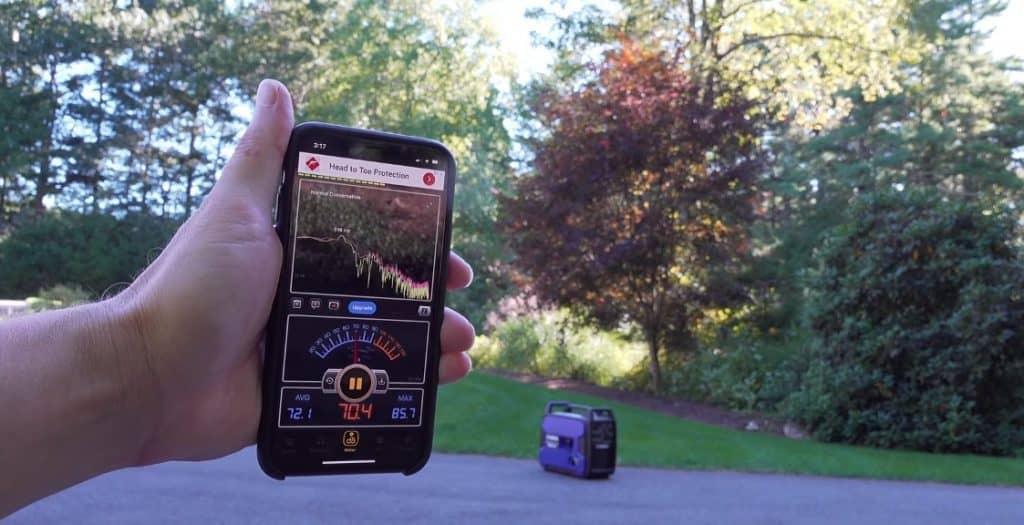
There is no need to run out and buy a “quiet” generator. I have tips to help you operate your faithful noisy generator in quieter manners.
If you insist on purchasing a “quiet” generator, I suggest you read over the decibel level first. This will be one of the biggest factors in the noise level of your generator. The lower the decibel level, the quieter the generator will operate.
Even reducing the decibel level by only a few points could make a significant difference. Some generators are specifically designed for quiet operation. As I said, you can still expect noise, but you might find significantly reduced noise levels.
The other factor that may impact the noise level of operation is the overall construction of the generator. High-quality materials, as well as improved ingenuity, can provide quieter operation as well.
My Top Tips for Quieter Generator Operation
I’ve provided some significant background to generator operation because I want to provide valuable information for the beginners who are just starting to experiment with generators.
If you want to follow tips to operate your generator more quietly, I think it’s important you truly understand how generators work and just what could affect your generator operation.
Do you use your generator at busy RV parks? Does your neighborhood have noise restrictions that are heavily enforced? Maybe your noisy generator keeps you awake at night?
Stop worrying about the noise, sit back, relax, and enjoy these useful tips.
1. Mufflers
You know how your car has a muffler and it reduces the noise of your vehicle? A car with no muffler is incredibly noisy and obnoxious.
Cars and generators, they both operate with engines and fuel under similar concepts. It stands to reason that SOME of the things that work for cars might also work for generators.
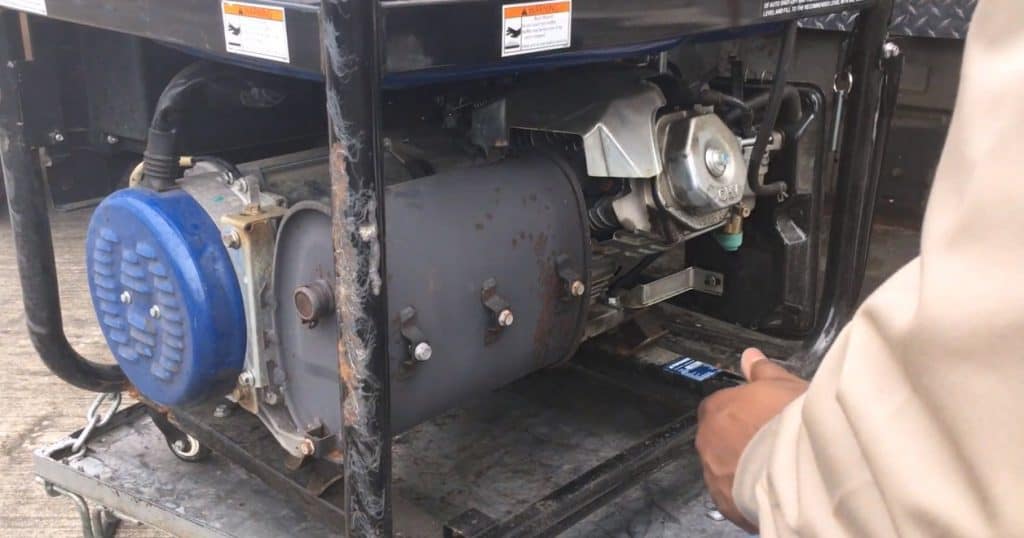
Like a generator muffler.
You can use a muffler for an auto to make your generator operate more quietly. You may need some help to accomplish this task if you want it done right, but it does work. A muffler can reduce your noise level by up to 15 decibels.
Rig it up yourself or weld it on, but doing it right with proper welding and maneuvering of the muffler will ultimately work the best.
2. Generator Padding
You can go about this in more than one way, depending on how effective you want it to be and what resources you have available.
I would like to also mention that there are options here that would also provide stability for your generator. Stability is another tip you will see coming up. So you see, two birds with one stone!
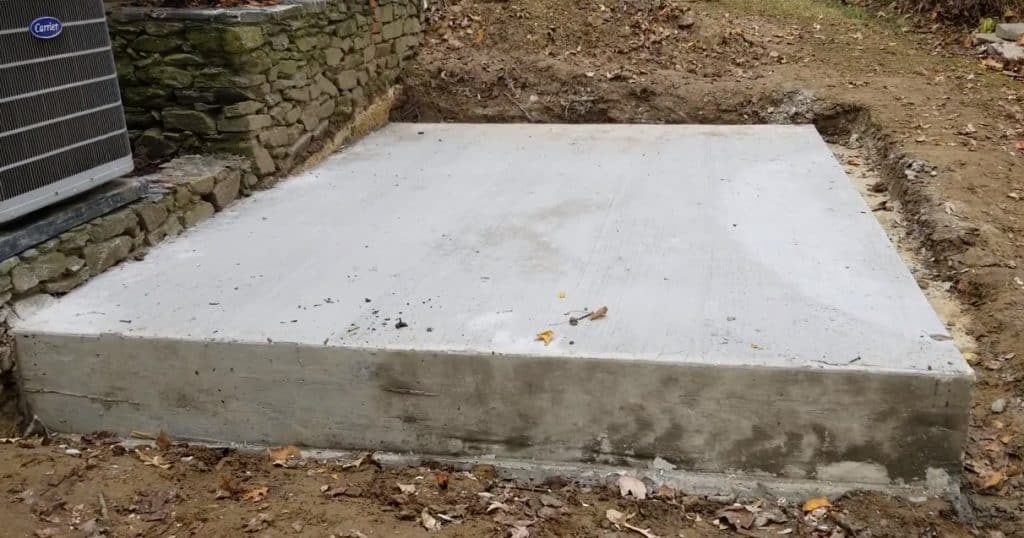
Generator pad is prepared for standby generators. Adding padding to the foundation underneath your generator can help reduce noise. Some of the noise for your generator’s operation comes from the vibrations of the engine running. It then echoes or reverberates from the ground underneath the generator which amplifies the sound.
You can improve upon this issue in more than one way, you can even combine options. Like I said before, double score here on 2 noise-reducing tips.
- Purchase waffle padding. It is relatively inexpensive for a small section and you just need enough for a large square or rectangle slightly larger than your generator. The waffle padding cushions the area beneath the generator and reduces the vibration, including the noise that results from the vibrations.
- Purchase a generator pad. You can actually purchase pre-made pads that are designed specifically for your generator to fit on top of. It is a concrete pad designed to hold your generator. You don’t have to worry about stability, which goes a long way to reduce noise as I will cover a bit more next.
You can make your concrete pad as a DIY project, but I always recommend bringing in the experts when you want the job done correctly. Don’t be afraid to call for help from people who work with this type of scenario and product every day. - Pair these two items together for maximum effect. Padding to thwart the vibration combined with a solid foundation and voila! You have reduced noise from your generator. You can thank me later.
3. Stabilization is Key
I promised you in the previous tip that I would get to this point. These two tips can easily go hand in hand, but they truly are separate issues.
Your generator vibrates. A lot. And it’s not a gentle massage chair vibration, it’s an intense rumble thanks to that powerful gas-powered engine. If your generator had a gas pedal, it might win the race!
Your generator most likely has a frame of some sort. It may be a simple steel-bar housing or it may be enclosed walls. Regardless, the vibrations are bound to rock and rattle the contraption.
Now picture a vibrating machine set haphazardly on the random ground that isn’t level or sturdy. What if there is any kind of weather causing the generator need that has led to mud or unsteady ground of some sort?
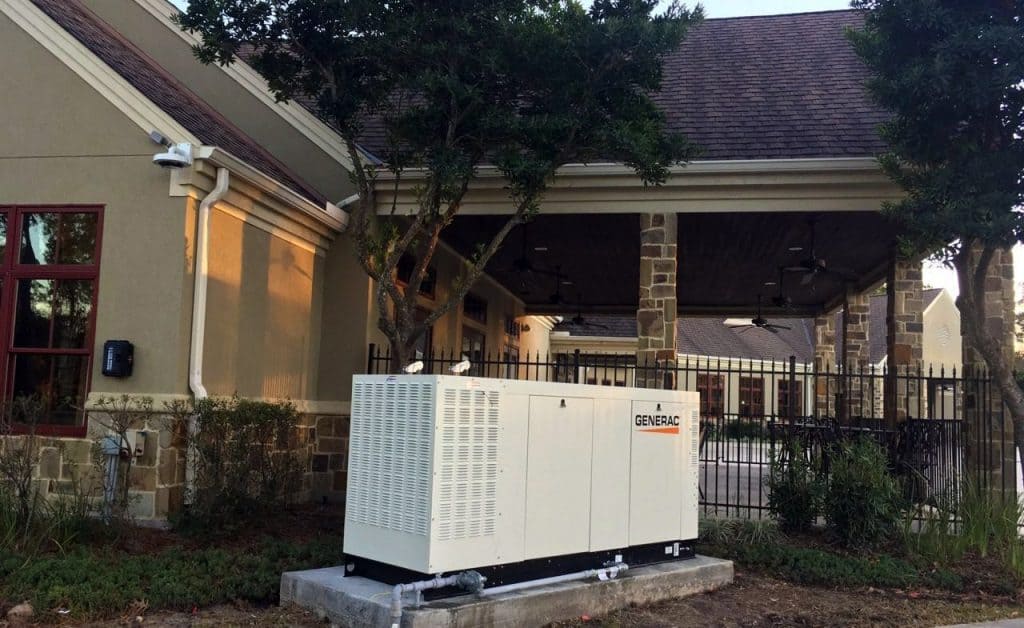
Take my word for it when I say, your generator needs stability. Stabilization is also a safety issue. You certainly don’t want to change your generator toppling over or moving around.
Stability is both a safety issue and a noise issue. With a stable setting, your generator will vibrate less because it has a proper foundation to support it. Additionally, you can anchor the generator down if you have it in a permanent location.
Try out a concrete pad for stability, you might be impressed at just what it can do for the operation of your generator overall but also for the sound behind your generation’s functionality.
4. Sounding Out
Your generator does not know that it is loud and obnoxious, but you do. So help that puppy out and set it up for success.
Make your own sound wall. You can do this with cinder blocks, bricks, concrete, or sound reducing substances like these. Simply build up a wall that is at least a foot taller than the generator. Keep in mind you need to be able to reach the generator.
If you build a wall like this, you need to keep it 6-12 inches away from the generator – no closer and also no farther away, but this gives you a reasonable range to work with.
Now again, I say, there are experts that know what they are doing. There are products specifically designed for many of these purposes. We believe in fulfilling your needs whether you decide to go for it and do it yourself or whether you seek expert guidance.
My top recommendation is always to seek expert guidance. Why fix something that has already been fixed?
There are these wonderful tools called generator quiet boxes. These boxes were built and designed to quiet the operation of your generator! Say what?
Yes, let me repeat that – professionally engineered boxes designed and built to surround your generator and therefore make operations much quieter.
These quiet boxes are built to last in all types of weather and they are specially made to work for your generator. They provide the appropriate airflow and access so that everything continues to work as needed, just much quieter.
You can purchase these in pre-made sizes or you can have them custom built. Again, you can even build your own using fiberboard materials but there’s no need when the job has already been completed by geniuses who knew we needed a quieting solution.
Also, I would like to point out that if you use your generator for an RV and a permanent foundation is not an option, these quiet boxes can be portable so this may be the perfect solution to your problems.
5. Smart Installation Maneuvers
So, the foundation for your quiet generator comes with installing it smartly. You can have any number of solutions, but the most effective solution is to take all of the knowledge being shared and put it together.
There are several minimal things you can consider if you need a smart life hack to keep your generator quiet. Until now, I’ve shared with you specific details and options but I have a few more tricks up my sleeve.
Let’s take a look at a few more small things you might be able to do.
- Consider the surroundings – the nature around your generation locale could help reduce the noise without additional works. If anything, it will benefit your efforts.
If you have sheds, outbuildings, fences, or large trees (amongst other things in the yard) use those items as a backdrop for the generator. Strategic placement can go a long way. These backgrounds can both absorb and refract the sounds that emit from your generator. - This doesn’t really help your neighbors, but the direction in which your generator faces can affect the noise you hear. You can turn the generator any way you please. So try turning the exhaust outwards, away from your home. This just pushes some of the noise away from your ears.
This can make the generator louder to your neighbors so keep in mind other noise-reducing techniques and maybe combine this with some of those. - Plywood and insulation can make your own housing selection. There are multiple DIY options that you can utilize but I would caution that you study recommendations and processes before trying them.
I want you to have all of the resources at your fingertips. While there are many professionals out there who can help you do it right, sometimes you may feel as though you have no choice but to figure it out.
Practice safety and don’t be afraid to at least as the professionals for sound advice for just jumping in. They can provide you with valid knowledge that may just protect you.
A New Generator Is a Solution
If worse comes to worst or you feel as though these options just won’t solve your noise problem effectively that’s ok. You CAN buy a new generator if you feel that is the best option.
We certainly don’t want you to feel as that is your only option. However, technology has significantly advanced and continues to advance. There are many quieter generators on the market.
My motto is you should do what works best for you. I will mention that even if you purchase a new generator, you can still apply many of these tips.
Summary
You don’t have to suffer through the noise. There are so many things you can do to help your generator operate more quietly.
Generators are just loud, the open engines and the steel frames simply don’t do much to mask the noise of operation, but that doesn’t mean you have to just deal with it.
I hope that you have found my tips to be informative and helpful and that there is something valuable here for you to take away and apply to your own generator situation.
